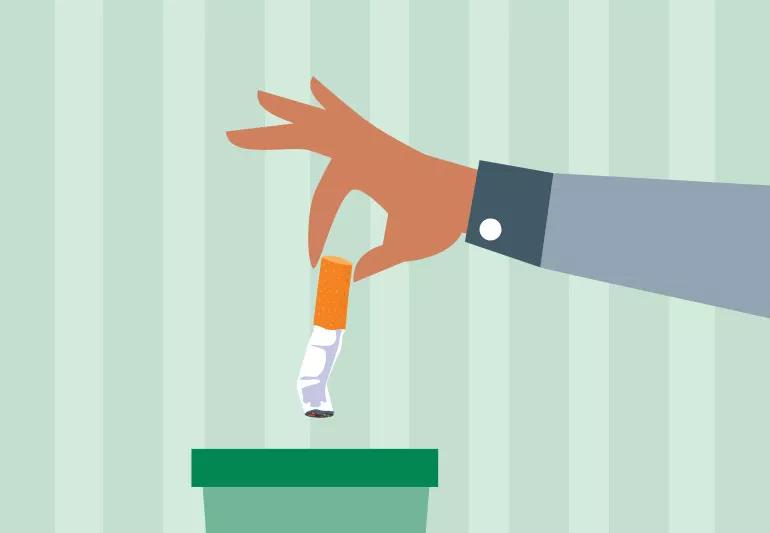5 tips to stub out cigarettes without the extra pounds

Image content: This image is available to view online.
View image online (https://assets.clevelandclinic.org/transform/d7fb34de-b5a4-41dd-954c-37336f25e8bb/quitSmokingWeight-1191386446-770x533-2_jpg)
quit smoking
Are you avoiding quitting smoking for good because you’re afraid of weight gain? If so, you shouldn’t let it get in the way of kicking the habit to the curb once and for all. And there’s good news — people who quit gain an average of only about five pounds after they quit. Most gain fewer than 10 pounds and many don’t gain weight at all.
Advertisement
Cleveland Clinic is a non-profit academic medical center. Advertising on our site helps support our mission. We do not endorse non-Cleveland Clinic products or services. Policy
And all of them gain a healthier body and healthier outlook.
According to pulmonologist Humberto Choi, MD, while it’s true there are biological challenges your body undergoes that can make quitting hard to stick to — you’re also much stronger than you know.
“Forget about the few uncertain pounds of weight that you may or may not gain later and instead focus on how much healthier and happier you’ll be enjoying the rest of your life smoke-free,” he says.
“Besides, here’s the real benefit of kicking the habit — once you quit smoking there’s a good chance you’ll be able to exercise more easily and shed those pounds. You’ll breathe and exercise easier, and you’ll feel better and more motivated on your new path to your healthier self,” Dr. Choi says. “Not to mention making a wise choice to fend off the many illnesses related to smoking.”
Studies show that many people who quit smoking are more likely to engage in a healthier lifestyle, adding in physical activities they were unable to do before and establishing a routine that help them stay fit.
“Once you decide you want to quit smoking, you can use these tips to prevent weight gain — and stay on track to be your best smoke-free self,” he says.
Advertisement
Nicotine causes spikes in excess sugar and tricks the body into thinking it has eaten. When you kick the nicotine habit, your body feels hungrier than ever, so keep it full the right way.
If you’re hungry between meals, snack on fresh veggies, fresh fruit or popcorn and complement your snack with a large glass of water. Choose fruits, veggies and other foods with fiber since it makes you feel fuller longer and more satisfied.
Nicotine increases your body’s metabolic rate temporarily. Once you quit, it returns to normal.
Boost your metabolism by engaging in physical activity. “Starting or maintaining an exercise plan is just as important as any other piece of the smoking cessation process,” Dr. Choi says.
Many people who smoke have a cigarette after a meal, which signals your body that the meal is over. You may need to create a new “signal” that tells your body it’s OK to stop eating.
“Try walking around the block, meditating for five minutes or even brushing your teeth,” he adds. “There are also many apps you can use to help.”
People who have quit smoking often say they miss having something to do with their mouths and hands. After quitting tobacco the need for oral gratification can be replaced too easily with food, so develop a positive substitute instead.
Chew on baby carrots or celery. Or keep your mouth busy while getting a dental boost by using dental picks. (As a bonus, you’ll remove the hard-to-reach plaque between your teeth.)
In the long run, even if you do gain a few pounds the many health benefits of quitting tobacco will outweigh them.
“Once you’re through with nicotine you can better focus your attention on making other positive lifestyle changes, such as portion control and exercising daily, which will help you meet your weight goals,” Dr. Choi says.
Advertisement

Sign up for our Health Essentials emails for expert guidance on nutrition, fitness, sleep, skin care and more.
Learn more about our editorial process.
Advertisement
Vaping exposes you to thousands of chemicals, including many that are known to cause cancer and lung disease
Smoking can make symptoms from cancer treatment worse, and can even make treatments less effective
From dental diseases to cardiovascular problems, the harmful effects of smoking hookah have plenty of downsides for your health
Even only a couple cigarettes a day can lead to potentially deadly lung diseases like COPD and emphysema
Your risk goes down once you quit, but you may still need a lung cancer screening
Cigarettes increase your risk of developing the condition and worsening its effects
Health benefits start within 20 minutes and continue to grow for years after
Each comes with substantial health risks and should be avoided
Prioritize your health by managing stress, strengthening your social connections and getting quality sleep
Bolsters, blankets, pillows and blocks can offer extra support, stability and comfort
Allergies, postnasal drip, asthma or reflux could be to blame for a cough that won’t quit